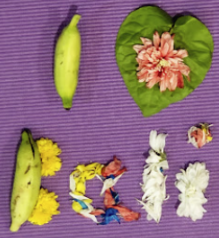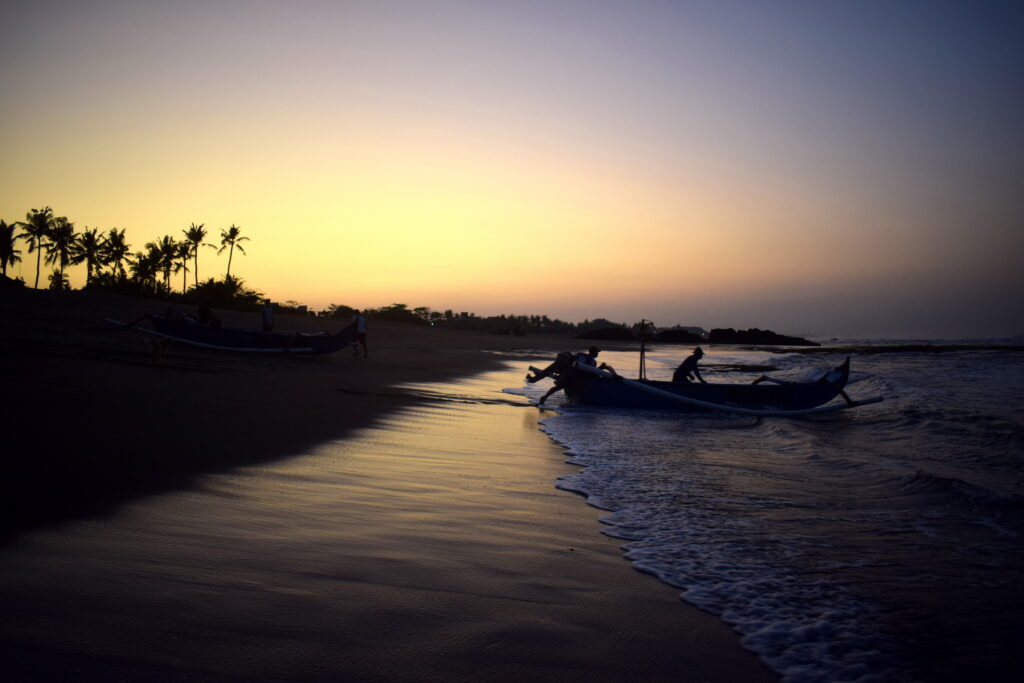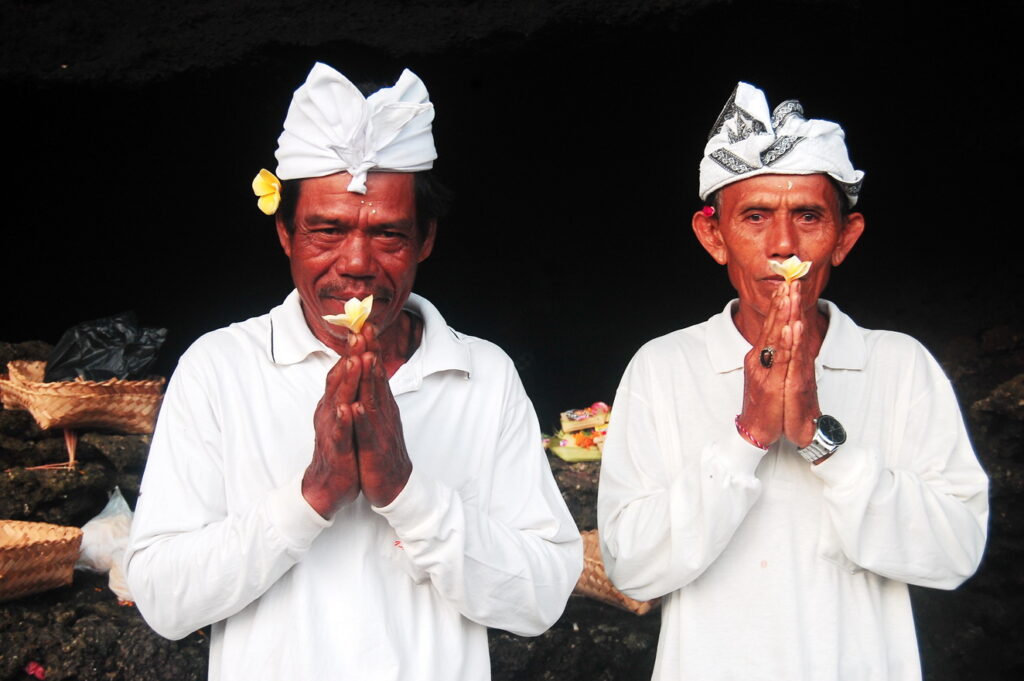iSpeech
The Best And The Worst About Balinese Culture: Gratitude and Knalpot Terror.
Stop Knalpot Terror
Caution: Reading this chapter can quickly become very addicting! It’s possible that after reading this, you’ll want to travel to Bali and check it out for yourself.
Balinese culture is primarily maintained by the mentality of Balinese Hindus. There are a few things that make them unique, including:
- How they think.
- How they act.
- How they navigate and orient themselves.
- And how they perceive your energy.
First and foremost, they hold this ceremony three times a day:
They practice gratitude, share offerings, burn incense sticks, pray, and meditate during their ceremonies. When they are done, they have broad grins spread across their faces, and after the ceremony, you will always notice that the Balinese are trying to make eye contact and smile at you. If you smile back, it feels so good; they give so much love when they smile and try to make eye contact.
I can only suggest playing that game instead of the Russian game. What’s the Russian game? The Russian game is the opposite. The rules are simple: don’t make eye contact, and whoever smiles first loses. Actually, we Germans are pretty good at that game as well. But we have a hard time beating the Russians at their game. The Balinese do just the opposite. When they come out of the ceremony, they smile, look for eye contact, and share their love. And I can only tell you to do that too because it gives you so much energy. Actually, love is the only kind of energy that gets stronger when you share it. So go for it; you have nothing to lose!
One of the many great things about the Balinese is their gratitude. In their daily rituals, they take time to express their gratitude. Fear’s polar opposite is gratitude. I get the feeling that, compared to people in the west, people in Bali don’t have nearly as much fear in their lives. When there is gratitude, there is no room for fear.
They are also very courageous people... Sometimes, you’ll see construction workers climbing barefoot on a scaffold around a new building. They work without any safety equipment and even climb on the roof in flip-flops or thongs – which are what the Australians call the most common shoes here. Let me tell you, you won’t be able to believe it, but their risk tolerance is impressive. Often, it takes my breath away. They keep laughing their heads off when I tell them that people in Germany have insurance for their dogs!
The ceremonies are held three times a day in their temples at home. Each street also has a temple, where they hold one ceremony for a full moon and one for a new moon.
The Balinese Day Of Silence
Additionally, there are twice-yearly ceremonies at the temple itself. Apart from that, they do have events like Ogo Ogo or Nyepi. Let’s start with Nyepi because it is something very, very special. Nyepi is New Year’s Day in the Hindu calendar, which in the Western world is where we basically cure a hangover from a New Year’s Eve party. But in Bali, it’s a very special thing: it’s a day for quietness, and so it is also called the Balinese Day of Silence. People stay at home. You are not even allowed to go on the street. You are not allowed to light a fire. People even turn off the electricity. Since there shouldn’t be any light on Nyepi, it gets dark early because of the sunset. Nyepi’s intention is simply to retreat to a quiet place, listen to your inner voice, and reflect on your thoughts. The Balinese really stick to it. With the exception of those responding to an emergency, there is no traffic, and no cars are moving around. The airport is closed. Even hotels are almost entirely shut down and only provide the most basic services to their guests. The internet even gets cut off; yes, believe it or not: Internet service providers stop their service for 24 hours. Nyepi provides the best conditions to retreat to a quiet place, listen to your inner voice, and reflect on your thoughts. The experience is truly remarkable.
The day before Nyepi is called Ogo-ogo, which is quite the opposite of Nyepi. It looks like a carnival. About two or three months before Ogo-ogo, people start making big ghost figures and moving them through the streets. During a ceremony, they bring all these figures into the streets, where people shout, sing, and play traditional Balinese instruments while watching. It’s a really good show. Those figures are huge. But because of the way the electricity is wired here, the wires hang over the street, and the figures are so big that it’s hard to get them under the cables. I have a video on my YouTube channel explaining what happens during Ogo-ogo to make the figures go under the cables. And that also answers the question: Why is Bali not online on New Year’s Day, on Nyepi? Because they do so much damage to the cables that there is no longer an internet connection, just kidding!
Hardly Any Concept Of Time
Further, the Balinese are almost living only in the here and now. They hardly have an understanding of the past and future. This is even represented in the Indonesian language. The Indonesian language does not have a grammar to express the past or future tense. Verbs are always in the present tense. They can express the past and future in Indonesian, but only through phrases like: “in a week” or “ yesterday.” But a translation for “will be” or “was” doesn’t exist. One can only express the past or the future if one puts a specific point in time into the phrase. Since time only exists in the present tense, it is tough to make a date with a Balinese and have him arrive on time! Being on time is something only partially known here. I wouldn’t say that none of the Balinese understand the concept of time. But I would say that most Balinese people don’t take time as seriously as we do in the western world.
When Passed The Last Indonesian Ergonomist Away?
Another thing is that there is almost no understanding of technical things or ergonomy. Ergonomy is the study of how to build something so that it’s easy and fun to use. A lot of things in Bali are put together in ways that make you say, “How can they do that? It’s a pain in the arse to use it that way!” Probably the worst construction you get to see is plumbing. I think only the most useless child in a family is allowed to become a plumber here! It’s ridiculous that they build water pipes and drains without siphons. This is especially true if you come from Germany. We have a very perfectionist culture. What do you think, when did the last Indonesian ergonomist die? I suspect, that the first one hasn't been born yet.
Further, I have no idea how the Balinese maintain their orientation or sense of direction. Share a location on Google Maps? Oh, my God! If you want to read the map or ask someone, “Can you please show me where I need to go on Google Maps?” it’s almost impossible to get an answer. Also, when they drive around and see how they navigate, you’ll have a hard time understanding how they ever get where they’re going. When I first moved to Bali and gave my scooter to my girlfriend, I was worried I would never see either of them again. Because I was afraid, she wouldn’t find her way back to the house! So far, it’s always turned out that they came back. But the way they navigate makes it hard for me to understand how they do it!
Also, there’s this thing about math: If you go into a store and buy two things: One for IDR 15,000 and the other for IDR 20,000, you already know how much you have to pay, don’t you? Yes, so you should have to pay IDR 35,000. Most Balinese can’t figure that out without a pocket calculator. They enter numbers with entire zeros into the pocket calculator! So they’re not even abstracting to calculate 15 plus 20. They compute 15.000 plus 20.000. Now, when you pay, if you give them IDR 50,000, you expect IDR 15,000 back, right? But before they start looking, they use the pocket calculator again to figure out your change. People who can do that kind of math in their heads can only be found in two places: the market and gas stations. They keep figuring things out pretty well without a pocket calculator. Most of the rest of the Balinese, though? It’s funny to see, but you have to be patient until they are ready to figure out the result and get the change. If they have small change at all, which often isn't the case.
Waiting is also a big problem, at least for me, because I have a hard time being patient and service is often... well, let’s put it this way: very, very relaxed! If you give them two orders, they will probably only do one. For instance, if you order a beer and a hamburger, it’s very likely that you’ll only get one of them. On the way, the other one got forgotten!
On the other hand, even though the pace of work is slow, I’m impressed with the speed with which they produce results! Especially on construction sites! See, I first had to go on Visa runs every other month. I visited Thailand, Singapore, Malaysia, Vanuatu, New Caledonia, Australia, and many other countries in the region. When leaving Bali for a trip, I noticed a new construction site and wondered, “What will that be when it’s finished?” When I returned from my visa run four weeks later, the building was finished, and the shops were open! However, suppose you look at the construction sites during the day. In that case, you will notice the workers sitting in the shade, smoking a Sampurna cigarette. I have no idea how they do it, but I’m interested in finding out!
Resilience
Furthermore, the Balinese culture is resilient in many ways. Consider the influence of Western cultures. They tolerate visitors but refer to Westerners as “bule.” The word “bule” means “white person.” It is not considered racist to say so, as it is to call ebony people “black” or “negro" in the Western world. That’s something I find absurd to consider not being politically incorrect. In Bali, “bule” simply refers to a white person, a Caucasian, and they accept us as we are. Even in tourist areas, they maintain their culture and perform blessings and ceremonies. Even though they would have plenty of work serving tourists and visitors if they didn’t do the ceremonies, they still take the time to do them three times a day.
One aspect of Balinese resilience irritates me: their ability to deal with noise. Even though the noise can be deafening at times, Asians don’t appear to be bothered by it! There is a subculture in Bali known as the “Knalpot Terrorists.” The term “knalpot” is actually Indonesian for “exhaust pipe.” People ride around on motorcycles with a custom-made "knalpot" that has nothing inside. The motorcycles are becoming unbearably loud. Yuck! There are so many of those loud motorcycles on the road that it is a pain in the ass for me. Because I am extremely sensitive to noise, I enjoy quiet days like Nyepi. The noise from the motorcycles frequently made me very angry, and I despised the people who made that noise, especially at night. But I’ve recently discovered a way to deal with it and make peace with them, and I tell them:
"Tuhan, berkati kamu dengan otak dan knalpot baru."
Do you also want to give it a try?
"Tuhan, berkati kamu dengan otak dan knalpot baru."
OK? For the third and final time:
"Tuhan, berkati kamu dengan otak dan knalpot baru."
And that means, “May God bless you with a brain and a new exhaust pipe!”
I invite you to take part in this blessing, to start laughing, and to feel good when you hear a loud Knalpot.




